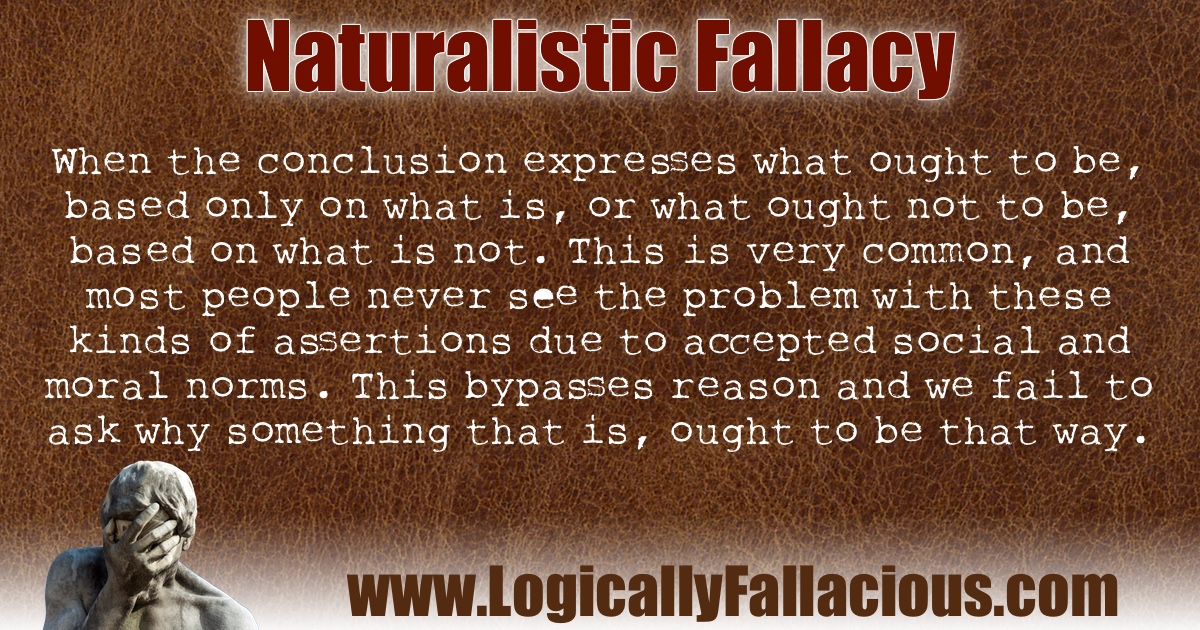(also known as: is-ought fallacy, arguing from is to ought, is-should fallacy)
Description: When the conclusion expresses what ought to be, based only on what is, or what ought not to be, based on what is not. This is very common, and most people never see the problem with these kinds of assertions due to accepted social and moral norms. This bypasses reason and we fail to ask why something that is, ought to be that way.
This is the opposite of the moralistic fallacy.
A more traditional use of the naturalistic fallacy is committed when one attempts to define “good” as anything other than itself. The philosopher G. E. Moore (1873-1958) argued that it is a mistake to try to define the concept “good” in terms of some natural property (thus, the name “naturalistic”). Defining the concept “good,” Moore argued, is impossible since it is a simple concept; a concept that cannot be defined in terms of any other concept. Not all philosophers agree that this is a fallacy. Some have argued that ethical terms, such as “good” can be defined in nonethical natural terms. They believe that ethical judgments directly follow from facts, i.e., it is possible to argue from a fact to a value.
Logical Forms:
X is.
Therefore, X ought to be.
X is not.
Therefore, X ought not to be.
Homosexuality is / ought to be morally wrong (moral property) because it is not normal (natural property).
or
Homosexuality is not normal (natural property); therefore, it is / ought to be morally wrong (moral property).
Explanation: If we break this down, we can say the claim is that homosexuality (X) is not normal (X is not). We are arguing that homosexuality is morally wrong (X ought not to be) because it is not normal (X is not). The claim that homosexuality is not normal is based on defining normality as “commonly occurring.” We can see the flaw in this argumentation through a simple analogy: lying, cheating, and stealing are normal (in that most people do it at some time in their lives), but this doesn’t make those actions morally good.
Example #2:
Nature gives people diseases and sickness; therefore, it is morally wrong to interfere with nature and treat sick people with medicine.
Explanation: If we break this down, we can say that the claim that nature gives people diseases and sickness is a declaration of what is (i.e., a natural property of the world). From this, we are deriving an ought (i.e., we ought not interfere...). The wording and order of these arguments can be confusing, but remember that the underlying fallacy here is the deduction of an ought from an is.
We go against nature (or what is) all the time. We cannot sometimes use nature as a moral baseline and at other times condemn her for her careless attitude and indifference toward the human race.
Exception: At times, our morality will be in line with what is—but if we are justifying a moral action, we need to use something besides simply what is.
Fun Fact: The naturalistic and the moralistic fallacies are often confused with the appeal to nature fallacy. One reason, perhaps, is because what is “natural” is another way of saying what is, is. But with the naturalistic and the moralistic fallacies, the conclusion does not have to be based on what is “natural;” it just has to be based on what is. For example,
Since wars have taken place since the beginning of recorded history, then they can’t be morally wrong.
This is another example of the naturalistic fallacy but not an appeal to nature.
Social Media Share Image: Drag and drop this to your desktop to use freely in social media or just share this page.
